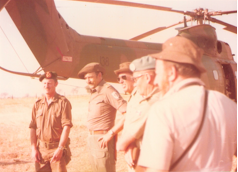Tuesday and Thursday, 0905 – 11.55, July-August 2014

UN peacekeepers (including Canadian in blue beret) escorted by South African general on reconnaissance to Namibia, then controlled by apartheid South Africa, (August 1978)
This course unfolds in the context of close study of the polities, economies, and conflicts in Africa, most notably the drive towards complete decolonisation. Course time will be divided roughly 50%–50% between Canada–Africa. It begins with Canada’s humanitarian and mostly British Empire-related connections to Africa in the pre-1945 period. The bulk of the course focuses on the post-war era with a bias towards more recent decades. The canvas is large: the entire continent of Africa, with particular issues and African states examined as appropriate. Successive Canadian governments and their foreign policies on Africa will be considered. We will discuss their attempts to develop relations with African states and peoples, in the face of contentious political and security challenges, and despite vast distances and different levels of development. The main goal of Canada’s Africa policy, the course will suggest, has been and is to develop warm relations with the continent’s states and peoples, so Africa is not alienated from Canada and the West, and Canada is in a position to build constituencies of support on issues of common concern.
For more information please contact the Department of History, at 613-520-2828 or email to history@carleton.ca